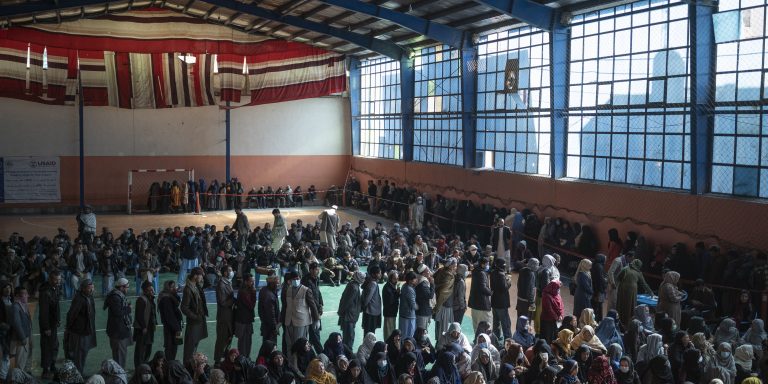INTELBRIEF
January 7, 2022
IntelBrief: Humanitarian Exemptions Eliminate One Major Obstacle in Afghanistan

Bottom Line Up Front
- In late December, the United Nations Security Council and United States government instituted humanitarian exemptions to sanctions regimes affecting Afghanistan, providing a more viable path forward for aid delivery.
- The sets of sanctions by the UN and U.S. created numerous obstacles to humanitarian operations, while also increasing derisking measures by financial institutions.
- While falling short of providing a silver bullet for humanitarian assistance in Afghanistan, these exemptions undoubtedly lessen the external, rather than operational or security, obstacles to aid.
- The new humanitarian exemptions for Afghanistan are only the tip of the iceberg, however, to facilitate aid on the scale required.
In late December, the United Nations Security Council and United States government instituted much-needed humanitarian exemptions to sanctions regimes affecting Afghanistan, providing a more viable path forward for aid delivery. Following the U.S. withdrawal from Afghanistan and the Taliban’s seizure of control in August, months of discussion ensued in the international community about the significant, externally imposed obstacles to humanitarian efforts in the face of a food security crisis and plunging economy. Designations of individuals and terrorist groups serve a critical purpose of isolating and stemming the resources of perpetrators of terrorism and attacks on civilians, and the necessity of humanitarian exemptions does not negate the importance of ensuring that funds do not enable further violence. Such exemptions attempt to thread the needle to balance humanitarian and security imperatives. Currently, close to 23 million people are facing acute food insecurity in Afghanistan, and 1 million children are on the brink of famine. An estimated 98% of Afghans are not able to access a sufficient amount of food, according to the UN World Food Program (WFP).
The sanctions by the UN and U.S. created numerous obstacles to humanitarian operations, while also limiting access to institutions wary of engaging in business that might lead to criminalization or penalties, or accusations of “material support” (i.e. derisking). Despite the revised Financial Action Task Force (FATF) Special Recommendation 8, many civil society organizations and individuals have reported that proactive derisking measures have impeded their ability to transfer funds or operate in areas where humanitarian assistance is often most critically needed.
On December 22, the Security Council unanimously passed resolution 2615 (2021)—put forward by the U.S., which has traditionally opposed the inclusion of humanitarian exemptions in counterterrorism-related sanctions—asserting that “humanitarian assistance and other activities that support basic human needs in Afghanistan are not a violation” of implementation of sanctions under Security Council resolutions 2255 (2015) or 1988 (2011), particularly exempting such activities in relation to the Taliban as the de facto authorities. Subsequently, the U.S. Treasury Department issued general licenses that exempt humanitarian activities in Afghanistan by the U.S. government, international organizations, or NGOs from sanctions on the Taliban and Haqqani Network.
In response to the Security Council resolution, the UN Under-Secretary-General for Humanitarian Affairs and Emergency Relief Coordinator Martin Griffiths affirmed, “This humanitarian exception will allow organizations to implement the work we have planned, and it will give legal assurances to the financial institutions and commercial actors we rely on to engage with humanitarian operators.” Resolution 2615 (2021) declares the need to review implementation in one year and requires the UN Emergency Relief Coordinator to report to the Council on adoption of the resolution every six months. Indicating reason for cautious optimism, Mr. Griffiths also noted, “The impact of our assistance also depends on the cooperation of the de facto authorities in the country and on the flexibility of the funding we receive.”
While falling short of providing a silver bullet for the smooth delivery of humanitarian assistance in Afghanistan, these exemptions aim to lessen the external obstacles to aid. The liquidity crisis and financial sector’s hesitancy to engage in a still heavily sanctioned context will continue to haunt Afghanistan. Moreover, there are still UN-designated terrorist groups like the Islamic State Khorasan (IS-K) operating in Afghanistan; these groups have been designated under the counterterrorism sanctions regime (under Security Council resolution 1989) which does not include any humanitarian exemption. For humanitarian actors, the risks associated with operating in contexts with designated groups will still remain in that case. The chilling effect on the willingness of the international banking community to do business in Afghanistan for fear of facing penalties—regardless of humanitarian exemptions—remains a challenging impact derived from such sanctions regimes, barring provision of further technical guidance such as “comfort letters” from the U.S. Treasury Department to banks. Furthermore, approximately $9.5 billion of Afghanistan’s foreign reserves remain frozen by the U.S. The Security Council sanctions regime in Afghanistan, which includes fourteen members of the de facto authorities, effectively creates an arms embargo, travel ban, and asset freeze that affects individuals currently in government who are critical to the delivery aid in country, as recently highlighted by U.N. Special Rapporteur on the Promotion and Protection of Human Rights and Fundamental Freedoms While Countering Terrorism, Fionnuala Ní Aoláin. “Afghanistan will not get through the winter on emergency aid alone,” Mr. Griffiths recently warned, pointing to the salaries needed for Afghan public sectors workers and support for basic public services.
From a security perspective, humanitarian crises can ripen opportunities for radicalization and recruitment that compound the terrorist threat. However, sanctions measures that force humanitarian actors to limit operations or channel funds through unofficial channels can also have adverse effects on goals like addressing grievances that contribute to radicalization or monitoring the flow of funds in terrorism contexts. The immediate and dire humanitarian emergency in Afghanistan must be addressed for the human security of Afghan civilians in need, as well as to prevent the further growth of terrorism in the country and an impending refugee crisis. The new humanitarian exemptions for Afghanistan are only a first step, however, to facilitate aid on the scale required.